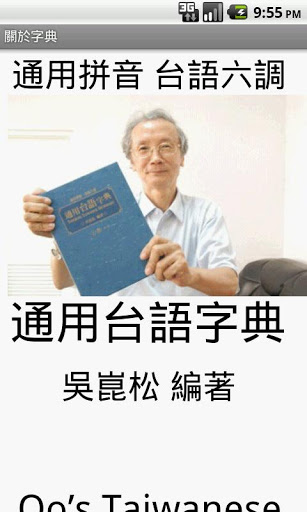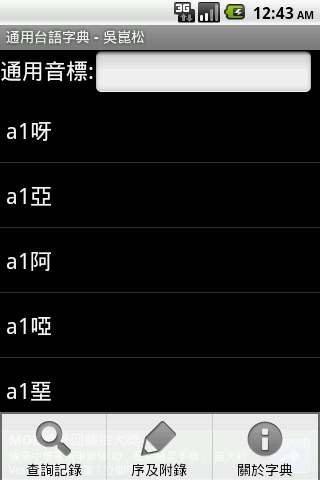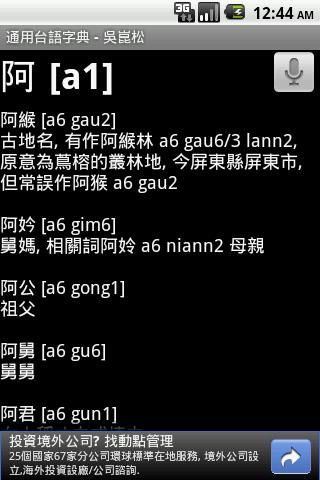General Taiwanese dictionary
The author Wu Kunsong is worried that Taiwan's local culture is getting weaker. It takes six years to write a general Taiwanese dictionary, and decided to donate a dictionary to more than 170 primary schools in Yunlin County. He hopes to improve the literary standards of Taiwanese and let Every Taiwanese can listen, speak and write Taiwanese.
Wu Kunsong was born in Huwei Town, Yunlin County in 1941. He graduated from Taichung No. 1 Middle School and the Institute of Industrial Management of Chenggong University. He fell in love with Taiwanese literature and has a strong local consciousness. He believes that to eliminate a culture, the language must first be eliminated. Taiwanese culture must not be lost.
In 2000, Wu Kunsong retired. He began to actively write the dictionary of Taiwanese. In 2003, he completed the first volume of 1 million words. In 2006, he completed the next volume of 1 million words, totaling 2 million words. Wu Kunsong said that the dictionary chose universal pinyin to mark Taiwanese. It is quite close to the English KK phonetic symbols used by the school, and it has redefined the Taiwanese 6 tone. It uses the four voices of Chinese and soft voices and the sixth voice of Taiwanese to make the Taiwanese 6 tone easier to use and circulate.
Wu Kunsong said that in order to enable the Taiwanese language to enter the international arena, he would use some controversial Taiwanese Chinese characters and Chinese characters that do not exist in the code of the Wan Guo code character to be substituted with other Chinese characters, so that all Taiwanese characters can be used by computers. Input and transmission, the goal is to make Taiwanese language international, scientific and elegant. He published this general Taiwanese dictionary. The most important purpose is to hope that everyone living in this land should not forget that they are Taiwanese, and they hope to systematically improve the literary standards of Taiwanese. Because some Taiwanese do not have proper Chinese characters, China's Xinjiang [Urumqi] has become synonymous with [roughly fabricated] in Taiwanese texts. Wu Kunsong said that the correct Taiwanese word should be [Wuhan wooden] (with smudgy wood) ), describe all products made with inferior filth wood, but more than 90% of the people do not know how to write, do not know the source of the story. Black eucalyptus (with sloping eucalyptus) is actually a poor quality wood. Because the wood is hollow, there is no way to make furniture. It can only be used as a raw material for firewood. [Wooden wood] is thus used to describe rough and shoddy. Inferior quality. In recent years, people have replaced [stained wood] with [Urumqi] in Xinjiang, China, and the results have been passed. However, this has lowered the cultural level of Taiwanese.
There are many mistakes in the use of Taiwanese characters. The most common one is [Ayi]. According to the Kangxi Dictionary, the word [嬷] is actually the meaning of the mother. If you want to call your grandmother, you should use the word [阿妈]. appropriate. In addition, when Taiwanese see a doctor, doctors often ask patients [have a card difference]? [Poor] is the meaning of worsening the condition. This is definitely a typo. You should use the word [瘥], which means healing. This cannot be used wrongly.
Wu Kunsong said that according to his research, about 70% of Taiwanese language composition comes from Chinese in Fujian, Fujian, 25% is Pingpo language, and 5% is foreign language, so there are quite a few Taiwanese languages. It is quite difficult to spread Chinese characters. The 30% of Taiwanese (ie, Pingpu language and foreign languages) cannot of course be written and expressed in appropriate Chinese characters.
Email: brianqo@gmail.com
Ver 1.0.1015 1. bug fix: The problem that causes the application to close when entering the [Query Record] page Ver 1.0.1014 1. Move the ad below to avoid affecting reading and operation 2. Adjust the layout Ver 1.0.1013 1. Add banner 2. Adjust application permissions 3. Amend the contents of the appendix and preface (garbled and typesetting) 4. Fix the problem that the scroll is not smooth

 Samsung Galaxy Young 2
Samsung Galaxy Young 2










































































